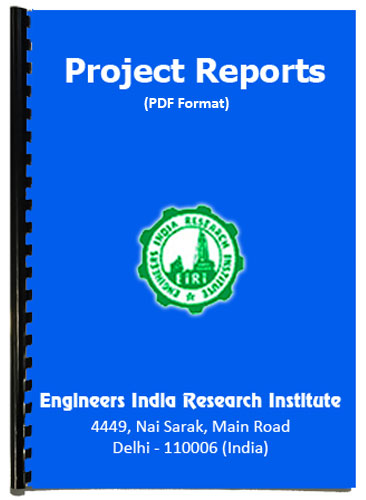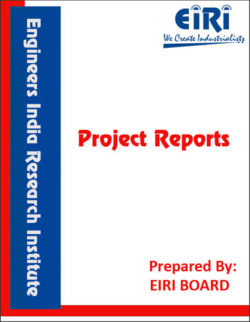MANUFACTURING OF PVC/PU SYNTHETIC LEATHER
The project report includes Present Market Position and Expected Future Demand, Market Size, Statistics, Trends, SWOT Analysis and Forecasts. Report provides a comprehensive analysis from industry covering detailed reporting and evaluates the position of the industry by providing insights to the SWOT analysis of the industry.
We can prepare PROJECT REPORT as per your INVESTMENT PLAN for BANK LOAN REQUIREMENT and INDUSTRY ANALYSIS. All reports are prepared by highly qualified consultants and verified by a panel of experts.
Have Query? Click Here to Chat
Industry Expert is Online, Chat with him for more detail.

For many years a range of leather like materials has been in use for sockings, linkings and uppers. They are all based of fabrics, usually woven and mainly of cotton. These base cloths should be carefully selected to give the requisite physical properties for shoe uppers and they may be coated with oil or PVC or rubber compound, Cellulose derivatives or synthetic resin (plastics). The surface may be smooth, with high polish or matt effect, or embossed with designs, many of which simulate leather or fabrics. All these coated materials are totally impermeable to air and water, ventilation must therefore achieved by suitable shoe design. The earliest type of leather cloth was American Cloth, the coating being of linseed oil. This was followed by nitrocellulose coating. Both are practically obsolete for uppers, being superseded by plastic coatings, but they are used for sockings.
Plastic sheetings are also used for uppers of cheaper qualities of shoes. For shoe uppers the unsupported sheeting has proved unsatisfactory in making and the more usual upper materials consist of a specially woven fabric coated with a plastic film, nearly always plasticized PVC. Since this synthetic resin the most freely available in all country. The many constructional difficulties are gradually being overcome and owing to the impenetrable nature of a plastic film, the more general finishes cannot be used. PVC upper materials may be cleaned with petroleum cleaners without determinant to the luster of the surface and additional polish may be given by means of wax creams or light polishing on the rotary brush. PVC leather cloth is the most useful plastic. It has two grades, flexible or rigid which give by means of wax creams or light polishing on the rotary brush. PVC leather cloth is the most useful plastic. It has two grades, flexible or rigid which give it considerable scope. The flexible leather sheet is used for articles of clothing such as boot and shoe, sales, heels and uppers etc. In fact the range of products is so wide that it is impossible to state all of them.
PVC leather cloth is also known in other words as Artificial leather which is becoming increasingly popular all over the world because of shortage of actual leather and high cost of the same. Artificial leather is specially suitable for upholstery, shoe upper, attachicases, brief cases and all kinds of bags. It is water repellent and is chemically inert. It is much cleaner both in production and in use beside being competitive in price. Present inductions show that artificial leather goods have good export potential.
How it is possible to manufacture artificial leather in the small scale sector because of the introduction of automatic machines by the world renowned manufacturers of Japan, Akatsuki machinery works Ltd., who have exported already about 2,000 such plants to South East Asia and Middle East countries. The plant designed by them is continuous one line system, ensuring uniform quality of production of artificial leather as well as less labour costs. With the embossing device one can have plain as well as engraved designs manufactured. Colour of coatings would be according to your choice.
Now, the machineries for PVC leather cloth are being manufactured in India by a India renowned manufacturers. A list of such manufacturers is given at the end of this report.
PVC leather cloth is manufactured by applying a coating of PVC paste on cotton cloth. The cloth has a coating with a glossy surfaced and smoothness to tough. It is used in air-proof and water-proof packing and also for decoration. It is extensively used in such applications which require a water proof media and strength. It is comparatively a new technique and has widely growth prospects. In India the manufacture of PVC leather cloth is very limited and there exists lot of scope for new industries in this field.
PVC leather cloths do not get affected by Heat or water. It is a substitute of natural leather cloth.
PVC leather cloth industry cloth industry has now become very common and the manufacturing technique is very simple.
Description
INTRODUCTION
SYNTHETIC LEATHER
SPECIFICATION AND FEATURES OF SYNTHETIC LEATHER
FEATURES OF SYNTHETIC LEATHER
FAUX LEATHER
TYPES OF FAUX LEATHER
PLEATHER
FIGURE 2: PLEATHER: PVC BASED (ON LEFT), PU BASED (ON THE RIGHT)
NAUGAHYDE
FIGURE 3: NAUGAHYDE
VEGAN LEATHER
FIGURE 4: VEGAN LEATHER
ADVANTAGE AND DISADVANTAGE OF FAUX LEATHER TO REAL LEATHER
ADVANTAGES OF FAUX LEATHER TO REAL LEATHER
DISADVANTAGES OF FAUX LEATHER COMPARED TO REAL LEATHER
USES AND APPLICATION OF SYNTHETIC LEATHER
USAGE OF SYNTHETIC LEATHER
AUTOMOTIVE
FOOTWEAR
FURNISHING
LEATHER GOODS
PU LEATHER
POLYVINYL CHLORIDE (PVC)
CHARACTERISTICS:
AVAILABLE FORMS
WEARING PROPERTIES
DETAILS OF RAW MATERIALS
1. PLASTICISER
2. FILLERS
3. STABILIZER
MARKET OVERVIEW OF SYNTHETIC LEATHER (GLOBAL)
GLOBAL SYNTHETIC LEATHER MARKET SHARE, BY APPLICATION,
INDIAN MARKET POSITION
THE BUSINESS
LEATHER VS ARTIFICIAL LEATHER
PRODUCTION PROCESS
CHALLENGES
REQUIREMENT OF FAUX LEATHER
PRESENT MANUFACTURERS/EXPORTERS/SUPPLIERS
MANUFACTURING PROCESSES OF SYNTHETIC LEATHER
1. THE FIRST WAY IS CALENDERING WAY.
2. THE SECOND WAY IS RELEASE PAPER WAY
PU LEATHER MANUFACTURING PROCESS
1: FIRST WAY IS WET PU LEATHER MANUFACTURING METHOD
2: SECOND WAY IS DRY PU LEATHER MANUFACTURING METHOD
MANUFACTURING PROCESS IN DETAILS
FORMULA WHICH IS USED FOR MIDDLE COAT
PRODUCTION PROCESS OF FAUX LEATHER
DIRECT COATING PROCESS
TRANSFER COATING PROCESS
WET PROCESSOR COAGULATION
FORMULATION AND PROCESS OF ARTIFICIAL LEATHER OF
THERMOPLASTIC POLYURETHANE
LINING:
BED MATERIAL:
THE PRESCRIPTION OF BED MATERIAL FOLLOWING (WEIGHT RATIO):
THE PRESCRIPTION OF LINING FOLLOWING (WEIGHT RATIO):
SPECIFICALLY SET FORTH ARTIFICIAL LEATHER MANUFACTURE METHOD:
POLYURETHANE COATED FABRIC MANUFACTURING PROCESS
THE TRANSFER COATING SYSTEM
PROCESS FLOW DIAGRAM
OTHER COMMERCIAL METHODS
ARTIFICIAL LEATHER WITH CLOTH BASE AND FOAMED PVC FILLER
A FORMULATION OF THE IMPREGNATING PLASTIC PASTE, FOAMABLE
OR NON-FOAMABLE, IS AS FOLLOWS:
(A) PREPARATION OF NON-WOVEN MAT:
(B) MANUFACTURE OF ARTIFICIAL LEATHER:
PRODUCT I
PRODUCT II
PRODUCT III
EXAMPLES
EMBODIMENT I
EMBODIMENT II
EMBODIMENT III
ARTIFICIAL LEATHER
LAMINATED ARTIFICAL LEATHER
(I) FOR PVC AS THE FACE LAYER:
(II) WHEN PU IS USED AS FACE LAYER:
INGREDIENT PART BY WEIGHT
EXAMPLE 1
EXAMPLE 2
EXAMPLE 3
METHOD FOR FORMING LAMINATED SYNTHETIC LEATHER
FEW IMPORTANT DETAILS DURING PROCESSING
SUPPLIERS OF RAW MATERIAL
PVC RESIN
TITANIUM DIOXIDE
LEAD STEARATE
DIOCTYL PHTHALATE
COLOR PIGMENT
SUPPLIERS FOR PLANT AND MACHINERY [INDIAN]
SUPPLIERS OF PLANT AND MACHINERY
BALL MILLS
COOLING TOWERS & HEAT EXCHANGERS
APPENDIX – A:
01. PLANT ECONOMICS
02. LAND & BUILDING
03. PLANT AND MACHINERY
04. OTHER FIXED ASSESTS
05. FIXED CAPITAL
06. RAW MATERIAL
07. SALARY AND WAGES
08. UTILITIES AND OVERHEADS
09. TOTAL WORKING CAPITAL
10. TOTAL CAPITAL INVESTMENT
11. COST OF PRODUCTION
12. TURN OVER/ANNUM
13. BREAK EVEN POINT
14. RESOURCES FOR FINANCE
15. INSTALMENT PAYABLE IN 5 YEARS
16. DEPRECIATION CHART FOR 5 YEARS
17. PROFIT ANALYSIS FOR 5 YEARS
18. PROJECTED BALANCE SHEET FOR (5 YEARS)



